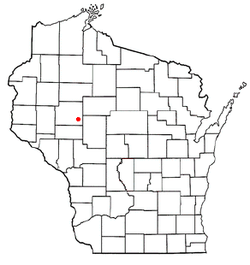Delmar, Wisconsin
| Delmar, Wisconsin | |
|---|---|
| Town | |
 Location of Delmar, Wisconsin | |
| Coordinates: 44°58′N 91°0′W / 44.967°N 91.000°WCoordinates: 44°58′N 91°0′W / 44.967°N 91.000°W | |
| Country | United States |
| State | Wisconsin |
| County | Chippewa |
| Area | |
| • Total | 43.0 sq mi (111.2 km2) |
| • Land | 42.9 sq mi (111.2 km2) |
| • Water | 0.0 sq mi (0.1 km2) |
| Elevation[1] | 1,132 ft (345 m) |
| Population (2000) | |
| • Total | 941 |
| • Density | 21.9/sq mi (8.5/km2) |
| Time zone | Central (CST) (UTC-6) |
| • Summer (DST) | CDT (UTC-5) |
| Area code(s) | 715 & 534 |
| FIPS code | 55-19625[2] |
| GNIS feature ID | 1583072[1] |
| PLSS township | T29N R5W and part of T29N R6W |
Delmar is a town in Chippewa County in the U.S. state of Wisconsin. The population was 941 at the 2000 census. The unincorporated community of Maple Hill is located in the community. The unincorporated community of Brownville is also located partially in the town.
Education
The town is served by the School District of Cadott Community and the Stanley-Boyd Area School District.
Geography
Delmar is six miles north to south and seven to nine miles east to west. According to the United States Census Bureau, the town has a total area of 43.0 square miles (111.2 km²), of which 42.9 square miles (111.2 km²) is land and 0.04 square mile (0.1 km²) (0.05%) is water.
History
The six by six mile squares that became Delmar were first surveyed in the fall of 1848 by crews working for the U.S. government. In November 1849 a crew marked all the section corners of the eastern six by six square, walking the woods and swamps on foot, measuring with chain and compass.[3][4] When done, the deputy surveyor filed this general description:
In the Southern part of this Township there is a considerable quantity of valuable Pine timber. In the Southwest quarter of Section 5 there are two unoccupied Cabins. The Surface is generally flat, the Soil poor & wet and but a Small portion adapted to farming. The banks of the Steams are low and the current Swift. Yellow River runs through the North Western Corner of the Township and there is also a considerable stream on the Eastern Part, which affords a good source(?) water power. It is heavily timbered with Birch, Maple, Sugar Pine & Oak.[5]
Demographics
| Historical population | |||
|---|---|---|---|
| Census | Pop. | %± | |
| 1990 | 994 | — | |
| 2000 | 941 | −5.3% | |
| 2010 | 936 | −0.5% | |
| Est. 2013 | 943 | 0.7% | |
As of the census[2] of 2000, there were 941 people, 314 households, and 252 families residing in the town. The population density was 21.9 people per square mile (8.5/km²). There were 328 housing units at an average density of 7.6 per square mile (3.0/km²). The racial makeup of the town was 98.72% White, 0.11% African American, 0.64% Native American, and 0.53% from two or more races. Hispanic or Latino of any race were 0.11% of the population.
There were 314 households out of which 39.5% had children under the age of 18 living with them, 70.7% were married couples living together, 3.5% had a female householder with no husband present, and 19.7% were non-families. 16.2% of all households were made up of individuals and 8.0% had someone living alone who was 65 years of age or older. The average household size was 3.00 and the average family size was 3.39.
In the town the population was spread out with 31.9% under the age of 18, 7.1% from 18 to 24, 27.1% from 25 to 44, 22.3% from 45 to 64, and 11.6% who were 65 years of age or older. The median age was 36 years. For every 100 females there were 106.4 males. For every 100 females age 18 and over, there were 109.5 males.
The median income for a household in the town was $40,278, and the median income for a family was $40,982. Males had a median income of $25,875 versus $19,531 for females. The per capita income for the town was $15,912. About 7.8% of families and 9.1% of the population were below the poverty line, including 7.1% of those under age 18 and 17.8% of those age 65 or over.
References
- ↑ 1.0 1.1 "US Board on Geographic Names". United States Geological Survey. 2007-10-25. Retrieved 2008-01-31.
- ↑ 2.0 2.1 "American FactFinder". United States Census Bureau. Retrieved 2008-01-31.
- ↑ "Land Survey Information". Board of Commissioners of Public Lands. Retrieved 26 March 2011.
- ↑ "Field Notes for T29N R5W". Original Field Notes and Plat Maps, 1833-1866. Board of Commissioners of Public Lands. Retrieved 9 March 2013.
- ↑ Welsh, H. B. "Interior Field Notes (Nov. 1849)". Land Survey Notes. Board of Commissioners of Public Lands. Retrieved 2013-03-09.
| |||||||||||||||||||||||||||||||||
